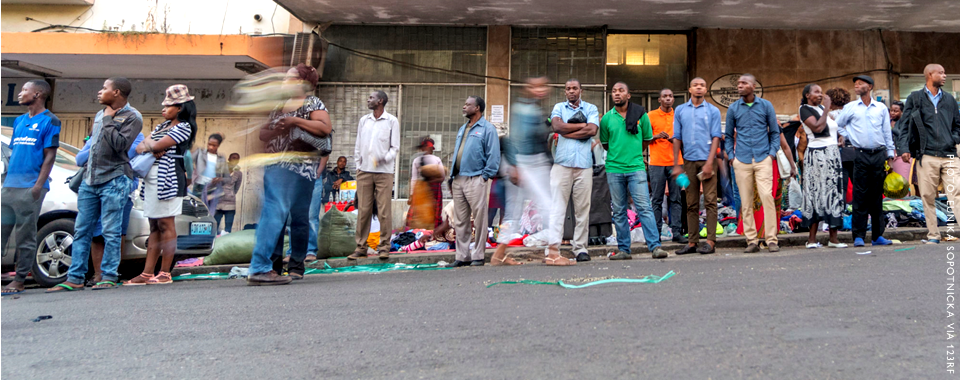BY NATALIE FIERTZ
A combination of natural disasters, insurgent attacks, and a contested election resulted in another challenging year for Mozambique, which tied with Libya for the second-most worsened country on the 2020 Fragile States Index (FSI). Already beset by increasing structural pressures across multiple indicators, Mozambique’s steady worsening over the past several years in the FSI – the world’s six-most worsened country over the past decade – has highlighted its high vulnerability to event-driven risks. In 2019, this combination of structural vulnerability and risk combined to create a humanitarian disaster when the country was hit by two of the worst cyclones in modern history.
On March 14, central Mozambique was struck by Cyclone Idai, one of the worst tropical cyclones to affect the Southern Hemisphere. Idai destroyed 90 percent of Beira, Mozambique’s fourth-largest city and home to over half a million people. More than 600 people died nationwide and over 100,000 people needed emergency evacuation in Beira and the surrounding Buzi District. Widespread damage to schools and homes left hundreds of thousands internally displaced. In the aftermath, there were outbreaks of cholera and malaria, though prompt action by the government and the WHO prevented them from becoming full-blown epidemics. A month later, the northern province of Cabo Delgado was hit by Cyclone Kenneth, which destroyed another 30,000 houses and left 160,000 people displaced. Together, the two storms left 2.2 million in need of urgent assistance and caused an estimated US$3 billion in damage. Further compounding the crisis was the destruction of 715,000 hectares of crops, while the south of the country experienced the second consecutive season of drought.

When Cyclone Kenneth hit Cabo Delgado in northern Mozambique, it struck a province that has been dealing with an insurgency since late 2017. Once the birthplace of the ruling Frelimo party and the national liberation struggle, Cabo Delgado is today colloquially known as Cabo Esquecido, the Forgotten Cape, ranking at the bottom of most social and economic indicators. Despite substantial reserves of natural gas, the province is characterized by widespread poverty, lack of education, and the absence of basic public services. In this vacuum, powerful criminal networks have risen, fueling illicit trade in heroin, gemstones, poached wildlife, and more. Political figures and members of the ruling party have openly benefited from these illicit networks, further undermining state legitimacy.
The insurgency in Cabo Delgado began in October 2017, when a group of armed men attacked three police stations in Moçimboa da Praia. Initially unsophisticated and using rudimentary weapons such as machetes, the attacks have grown in number, brutality, and sophistication, including the first use of an IED in March 2019. This increasing sophistication has been accompanied by allegations that members of the security forces have provided weapons and training to the insurgents.
Journalists have been arrested and barred from working in the region, while public officials have been contradictory, alternatively blaming bandits, artisanal miners, and global jihadism. The insurgents, on the other hand, have not put forth any official ideology or list of grievances. While some believe they are linked to a group that split from the Islamic Council of Mozambique in the early 2000s to promote a stricter form of Islam, others are skeptical. The seemingly indiscriminate attacks have made a religious motivation difficult to discern, and some aid officials and researchers working in the region believe there are actually multiple distinct groups operating in the province.
The government response to the insurgency has been heavily reliant on repressive approaches such as arbitrary arrests, indiscriminate violence, and the closure of mosques. These measures – combined with security forces rendered ineffective due to lack of training, morale, and equipment – have further alienated the local population. The Mozambican military launched offensive operations in October 2019 with the support of Russian mercenaries, but reports suggest that this merely dispersed the insurgents into smaller groups, with reported violence against civilians increasing sharply the following month.
The insurgency in Cabo Delgado was erupting just as conflict between the Frelimo party, which has ruled Mozambique since independence, and the opposition Renamo party reignited. The two fought a brutal civil war between 1977 and 1992, with sporadic clashes arising between 2013 and 2016. A renewed peace process, which persisted even through the death of Renamo’s leader Alfonso Dhlakama, culminated in a new peace treaty that was signed in August 2019. Although an armed faction of Renamo refused to disarm, hopes for sustainable peace were high.
Those hopes are now in danger after the general elections of October. At least 44 people were killed and U.S. and European Union observers noted attacks on opposition candidates, the exclusion of independent observers, fraud, and intimidation. The election itself was a rout; incumbent president Felipe Nyusi won 73 percent of the vote and Frelimo was victorious in all ten provincial assemblies, including the three Renamo had won in the 2014 elections. The results were also a major departure from those of local elections a year earlier in which Frelimo had won only 51 percent of the vote. Both Renamo and MDM, Mozambique’s third largest political party, rejected the results and requested the election be annulled, an appeal rejected by the Constitutional Court. Reports now suggest that key elements of Renamo feel that the peace treaty has been broken, with some members considering a return to the party’s wartime base.
The severe long-term worsening trend in Mozambique, as detailed previously in the FSI, should already have raised the alarm on the country’s political, social, and economic fortunes. However, even beyond Mozambique’s increasing structural pressures and vulnerabilities – not to mention the recent alleged embezzlement of US$2.2 billion by various government officials and their family members, as well as decimation by natural disasters – the potential re-heating of the country’s long-running conflict presents an ever greater risk for Mozambique into 2020, with little relief in sight.
